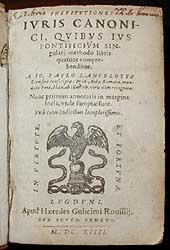|
Prescription
Norm 8A of the Essential Norms provides for a dispensation from prescription and, of course, on February 7, 2003, the Holy Father granted a derogation from the law, empowering the Congregation for the Doctrine of the Faith to dispense from prescription. With all due respect, the question remains, however, as to whether this is a good law and is in harmony with our canonical tradition.
(On July 14, 2004 the CDF announced that after November 21, 2004 it will no longer accept cases in which the alleged offense was bound by prescription and in which the alleged offense had been denounced to the bishop before April 30, 2001.)
In the newly published volume of the Boston College Law Review, Father Ladislas Orsy, S.J. has written the following analysis of the provision for dispensing from prescription (Ladislas Orsy, S.J., Bishops’ Norms: Commentary and Evaluation, Boston College Law Review, Vol 44, Number 4/5, 2003, pp. 999-1030):
Pages 1015-16:
Norm 8.A (continued):
“If the case would otherwise be barred by prescription, because sexual abuse of a minor is a grave offense, the bishop/eparch shall apply to the Congregation for the Doctrine of the Faith for a dispensation from the prescription, while indicating appropriate pastoral reasons.”49
The meaning of Norm 8.A is clear: the CDF may set aside the effect of prescription. Such a power is novel: to dispense from, or to “annul,” a prescription is an unheard of act in Roman law tradition, where the roots of canon law are. It seems that the drafters of this Norm confused the nature and effect of the canonical “prescription” with that of the Anglo-American “statute of limitations.” The two have a common effect: both erect a bar to a legal action (estoppel) after a certain time period elapses, but they are radically different in nature. Statutes of limitations merely bar actions; prescriptions create or extinguish the rights and obligations themselves. Hence, dispensation from a statute of limitations is conceivable;50 dispensation from the [*PG1016] rights and duties created by prescription does not make sense. Apart from undermining genuine “vested rights” in all circumstances, in criminal law it would be equivalent to retroactive legislation: it would recreate an extinguished crime and destroy an acquired innocence.51
49 Id.
50 California has recently removed the statute of limitations for certain claims of child sexual abuse for one year. See Cal. Civ. Proc. Code § 340.1 (West Supp. 2003). In canon law, however, even if the Anglo-American idea of “limitation of actions” were introduced, dispensation would not be automatically available to local Ordinaries: they are not entitled to dispense from procedural law. See 1983 Code c.87.
51 By way of an example, in the Roman law tradition in matters of property, prescription may create ownership. Whoever heard of a dispensation from, or the annulment of, a legitimately acquired and fully vested ownership?
Page 1020:
The Norms limit the immunity acquired by “prescription” in the case of child sexual abuse: the required “useful time” starts when the victim turns eighteen years of age and it runs for ten years. A significant difficulty is that the Norms substitute the American concept of “statute of limitations” of action for the classical Roman devise of prescription.69
In early Roman law, prescription was used as a procedural norm barring action; later however, it developed into an institution creating and extinguishing substantive rights; for example, in matters of property it became a way of “acquisition” that could be asserted by vindicatio—an action grounded in ownership. See Adolf Berger, Encyclopedic Dictionary of Roman Law 645–46 (1953) (entries on the various forms of “praes-criptio”).
In canon law “prescription” is defined in canon 197: “prescription is a means of acquiring or losing a subjective right as well as of freeing oneself from obligations.” 1983 Code c.197. This definition goes well beyond a procedural device, it speaks of substantive subjective rights. The use of the term “acquisition” is technical and precise: it refers mainly to property. Similarly, “obligation” refers to a legal bond, vinculum iuris, which has its origin either in a contract or in a “delict.”
Canon 197 determines that “[t]he church receives prescription as it is in the civil legislation of the nation in question . . . .” Id. “To receive” in this context means to make civil law part of canon law. But, of course, the Church can receive only what is there; in American law (maybe from Louisiana) there is no prescription that is “a means of acquiring or losing subjective rights as well as of freeing oneself from obligations”; there is only an “estoppel” barring an action. It follows that the Church should follow the American procedural norms (that for the American law can be “received”), but in matters of acquisitions and obligations, canon law stands unaffected. Ecclesiastical courts and administrators should respect vested rights “acquired” by canonical prescription and they should not try to revive obligations extinguished by canonical prescription.
If the above exegesis is correct, a “dispensation” that would revive an extinguished obligation—as the Norms require—does not make good sense in canon law. An extinguished obligation cannot be revived by a court order or by an administrative decree. See supra notes 50–51 and accompanying text.
If the analysis of Father Orsy is correct, and prescription grants an acquired right to immunity from prosecution, a dispensation from prescription seems inappropriate.
Even if one views prescription as equivalent to a statute of limitations, it seem unjust to grant a dispensation. The U. S. Model Penal Code eloquently expresses the reasons why justice and equity require maintaining statutes of limitations:
“First, and foremost, is the desirability that prosecutions be based upon reasonably fresh evidence. With the passage of time memories fade, witnesses die or leave the area, and physical evidence becomes more difficult to obtain, identify, or preserve. In short, the possibility of erroneous conviction is minimized when prosecution is prompt.
“Second, if the actor refrains from further criminal activity, the likelihood increases that he has reformed, diminishing the necessity for imposition of criminal sanctions. If he has repeated his criminal behavior, he can be prosecuted for recent offenses committed within the period of limitations. Hence, the necessity of protecting society against the perpetrator of a particular offense becomes less compelling as the years pass.
“Third, after a protracted period the retributive impulse which may have existed in the community is likely to yield to a sense of compassion aroused by the prosecution for an offense long forgotten.
“Fourth, it is desirable to reduce the possibility of blackmail based on a threat to prosecute or to disclose evidence to enforcement officials.
“Finally, statutes of limitations promote repose by giving security and stability to human affairs.”
[United States Model Penal Code (Sec. 1.06 Comment, 1985)]
The U.S. Supreme Court, in striking down the California law which allowed the prosecution of alleged sex offenders after the statute of limitations had run (Stogner v. California, decided June 26, 2003), described such a waiver of the statute of limitations as a violation of a state’s contract with its citizens:
“...the new statute threatens the kind of harm that, in this Court’s view, the Ex Post Facto Clause seeks to avoid. Long ago the Court pointed out that the Clause protects liberty by preventing governments from enacting statutes with ‘manifestly unjust and oppressive’ retroactive effects.[citation omitted] Judge Learned Hand later wrote that extending a limitations period after the State had assured “a man that he has become safe from its pursuit...seems to most of us unfair and dishonest.”[citation omitted] In such a case, the government has refused “to play by its own rules.”[citation omitted] It has deprived the defendant of “fair warning,” [citation omitted] that might have led him to preserve exculpatory evidence. “The statute of limitations is ... an amnesty...” And a Constitution that permits such an extension, by allowing legislatures to pick and choose when to act retroactively, risks both “arbitrary and potentially vindictive legislation...”
“Significantly, a statute of limitations reflects a legislative judgment that, after a certain time, no quantum of evidence is sufficient to convict.” [citation omitted] And that judgment typically rests, in large part, upon evidentiary concerns – for example, concern that the passage of time has eroded memories or made witnesses or other evidence unavailable.” [citation omitted] Indeed, this Court once described statutes of limitations as creating “a presumption which renders proof unnecessary.” [citation omitted]
Some have voiced the argument that, historically, reserved sins had no period of prescription and so dispensations from prescription can be liberally given in these cases. However, the critical fact is that the Church has seen fit to establish a period of prescription for these alleged offenses. At the request of the U.S. bishops the period of prescription was extended in 1994. To dispense now from prescription, as a matter of pastoral expediency, is to overlook the sound reasons for establishing periods of prescription. In the long term, it seems that it would undermine the Church’s long-established legal traditions.
|

